|
|
|
Sort Order |
|
|
|
Items / Page
|
|
|
|
|
|
|
| Srl | Item |
| 1 |
ID:
144982
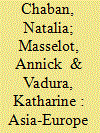

|
|
|
|
|
| Summary/Abstract |
This special issue sets out to explore the responses of norm-receivers to EU export of
norms and values. The main focus of this special issue is on the Asian recipients of EU
norms. The leading theoretical explanations—used by all contributors to this Issue—
are from the revisited analytical framework of ‘Normative Power Europe’ (NPE). NPE
is a popular conceptual paradigm that has informed debate about the EU since the early
2000s. Introduced in the seminal work by Ian Manners (2002), it remains a useful and
intellectually attractive model to understand the EU and its actions both internally and
externally. Its appeal lies in its emphasis on ideas; its open, eclectic and critical nature;
and its focus on explanations of power beyond state-centred models
|
|
|
|
|
|
|
|
|
|
|
|
|
|
|
|
| 2 |
ID:
158419
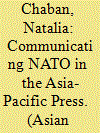

|
|
|
|
|
| Summary/Abstract |
This article provides a reflection on the communication phase in a narrative’s cycle. It explores and compares NATO narratives communicated by influential press in NATO’s five Asia-Pacific strategic partners (16 media outlets observed on a daily basis between February–July 2015). The analysis traces NATO narratives communicated to broader society on the system, identity, and policy-issue levels. Innovatively linking strategic narrative theory by Miskimmon, O’Loughlin, and Roselle and the cascading activation framing theory by Entman, the article explores a range of narratives and assesses what narratives enjoyed higher visibility, stronger local resonance, and more pronounced emotive charge while communicating NATO as a capable IR actor. The article operationalizes and modifies elements of Entman’s theory (visibility, local resonance, and emotive charge, adding a category of capability), and then tests hypotheses based on this, using the inferential statistics Rasch Measurement Model. The article ends with a set of policy recommendations to NATO’s public diplomacy on how to capitalize on opportunities these narratives present and how to tackle challenges (specifically low local resonance and limited media visibility of the narratives).
|
|
|
|
|
|
|
|
|
|
|
|
|
|
|
|
| 3 |
ID:
142064
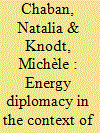

|
|
|
|
|
| Summary/Abstract |
This paper examines a supranational actor, the European Union (EU), as a producer of energy diplomacy. This study uses a comparative analytical framework of state-centred vs. multistakeholder diplomacies to explore EU energy diplomacy towards the ‘emerging’ powers of Brazil, India, China and South Africa (BICS). It also elaborates the multistakeholder model by advocating the inclusion of a new element – a consumer of diplomatic actions – into its conceptualization. In this way the paper suggests a new synthesis of the concepts of multistakeholder and public diplomacies. Advancing the notion of energy diplomacy, our analysis suggests that this type of diplomacy goes beyond state actors as producers of diplomatic outcomes, and is no longer confined to the norms of security of supply and competitiveness; EU energy diplomacy is a complex blend of multistakeholder and state-centred diplomacies, participants (producers and consumers) and communication modes. This comprehensive approach to diplomacy – led in the EU’s case by norms of sustainability, competitiveness and security of supply – is a response to the challenges of global governance, multipolarity and multinational cross-sectoral networks.
|
|
|
|
|
|
|
|
|
|
|
|
|
|
|
|
| 4 |
ID:
099332
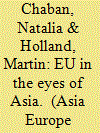

|
|
|
| 5 |
ID:
168957
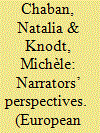

|
|
|
|
|
| Summary/Abstract |
The role of newsmakers as intermediaries in the shaping of external perceptions and reception of narratives advanced by different actors remains sparse in EU studies. This contribution fills this gap and addresses the personal images of the EU of newsmakers. We contribute to the understanding of those personal perceptions and their link to professional values of audience interest, newsworthiness and objectivity in reporting the EU. The article will demonstrate that all journalists perceive EU coverage in their respective locations are led by local priorities. Negative views of the EU as a weakening, biased, ineffective, elitist and arrogant actor are dominant. Arguably, they create conditions for the birth and dissemination of Euro-distant and even Euro-sceptic media narratives. The article will explain why this is the case while drawing on political/ideational and business/financial explanations.
|
|
|
|
|
|
|
|
|
|
|
|
|
|
|
|
| 6 |
ID:
158414
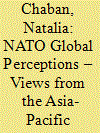

|
|
|
|
|
| Summary/Abstract |
In a world characterized by shifts in global power, NATO’s partnerships – in Europe as well as elsewhere – are critical for the organization. Yet the question of how the Alliance’s global partners perceive NATO in the context of cooperative security, collective defence, and crisis management – including NATO’s goals, operational capacity, functional capability, and influence – remains impressionistic and under-addressed. This paper launches discussion about images and perceptions of NATO in the alliance’s five global partners in the Asia-Pacific (Australia, Japan, Mongolia, New Zealand, and the Republic of Korea). It treats perceptions as key factors behind global expectations of NATO, and as a key cultural filter triggering a range of its partners’ reactions to NATO’s global initiatives. The paper sets out and explains the theoretical framework used for the Special Issue, Miskimmon et al.’s ‘strategic narrative’ theory, and explains how each of the articles respectively emphasize the formation, projection/communication and reception of NATO’s strategic narratives in the region. Contributions focus on external perceptions, images, and narratives of NATO after the end of the International Security Assistance Force (ISAF) mission in Afghanistan, and post-Crimea, and are discussed in a post-US election context.
|
|
|
|
|
|
|
|
|
|
|
|
|
|
|
|
| 7 |
ID:
170753
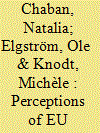

|
|
|
|
|
| Summary/Abstract |
A small but growing literature has started to analyse the European Union (EU) ‘as an effective peacemaker’. We make a contribution to this field by investigating EU mediation effectiveness in the Russia–Ukraine conflict. The focus is on perceptions of effectiveness. Based on information from semi-structured interviews, we compare EU self-images with Ukrainian evaluations of EU mediation efforts. How effective is the EU, including its Member States, deemed to be? What factors are believed to lie behind perceived (in)effectiveness? We concentrate on four such factors, derived from the mediator literature: perceived (im)partiality, coherence and credibility and, finally, evaluations of the EU’s mediation strategies. Both internal and external views singled out EU member states as the most effective actors in current mediation. The role of EU was seen in ambivalent terms by both sides. All the four determinants of mediation effectiveness are discussed in our material, but differ considerably in the degree of attention given to each of them. While (im)partiality is not a factor that is linked to effectiveness in any straightforward way, EU incoherence is associated with inconsistent and weak policies, notably in the Ukraine material.
|
|
|
|
|
|
|
|
|
|
|
|
|
|
|
|
| 8 |
ID:
153553
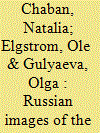

|
|
|
|
|
| Summary/Abstract |
This article probes into scope conditions for image change, investigating what changes in Russian images of the European Union (EU) have taken place as a result of the Russian–Ukrainian crisis. The crisis, a catalytic event, has been surrounded by uncertainty and strong emotions and is seen as a potential historical watershed in EU–Russian relations. The article examines Russia’s images of the EU’s intentions (good or bad?), capabilities (strong or weak?), and cultural and political status (inferior or superior?); and how they change in connection with the Russian–Ukrainian crisis. The article compares EU images across time found in Russian major newspapers and public opinion (studies undertaken in 2011–12 and 2015, before and after the crisis).
|
|
|
|
|
|
|
|
|
|
|
|
|
|
|
|
| 9 |
ID:
144987


|
|
|
|
|
| Summary/Abstract |
This analysis tackles a previously understudied topic—the ebb and flow of ideas towards the European Union (EU) as a ‘Normative Power’ found in an external society. It asks three questions. How can particular visions about a foreign policy actor—the EU in our case—be activated and disseminated in societies beyond the Union’s borders? Who are the key local actors who facilitate the spreading of these ideas? And how might the personal views towards the EU and its ‘Normative Power (NPE)’ identity of these key actors influence the activation of ‘NPE’ ideas in a given society? In answering these questions, this analysis brings together two theoretical models previously not linked—the NPE analytical approach (Manners, J Common Mark Stud 40(2):235–258, 2002) and the ‘cascading activation’ framing theory (Entman, Polit Commun 20(4):415–432, 2003, 2004). Empirically, this paper employs data from 74 face-to-face semi-structured interviews on the perceptions of the EU as a normative power. Interviews were held among the leading newsmakers from influential national media—news writers (journalists, columnists, reporters) and media gatekeepers (editors, news directors, publishers and news producers) from seven Asian countries.
|
|
|
|
|
|
|
|
|
|
|
|
|
|
|
|
| 10 |
ID:
168953
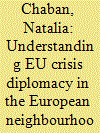

|
|
|
|
|
| Summary/Abstract |
This Special Issue seeks to better understand the role of communication and perception in EU crisis diplomacy. In a recent Special Issue in this journal, Catarina Kinnvall, Ian Manners and Jennifer Mitzen argue that, “ … the greatest security challenge facing people across Europe is not physical, despite the threats of Putin and ISIS, but is a sense of fear and anxiety over their daily lives” [2018. Introduction to 2018 Special Issue of European Security: “Ontological (in)security in the European Union”. European security, 27 (3), 249–265]. We take an interdisciplinary approach to widen the scope of studies on European security and offer new avenues for further research into how citizens in the EU’s neighbourhood understand the security challenges they face and the role the EU plays in addressing these. Through this, we aim to bring theoretical and methodological innovation to understanding the role of the EU as an external actor.
|
|
|
|
|
|
|
|
|
|
|
|
|
|
|
|
| 11 |
ID:
193228
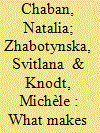

|
|
|
|
|
| Summary/Abstract |
Contributing to the ‘narrative turn’ in International Relations and offering an answer to the question ‘What makes a strategic narrative efficient?’, this article adds to the methodological theorization of the formation and projection phases of the narrative’s lifecycle. We suggest that the impact of the constructed image in the narrative can be reinforced by the interplay of at least three projection properties: (1) content accentuation and priming, through iterations; (2) content contextualization, through historical and cultural resonance with the consumers’ memories; and (3) content verbalization, through narrative tactics that evoke a range of the consumers’ involved attitudes to the framed image. These properties, being intrinsic ingredients of the projected content, tend to enhance emotions. In our work, they get traction in the antagonistic narrative tailored by the Russian propaganda to depict Ukraine orientated towards the European Union (EU). The empirical case study analyses articles published on the Russian e-news platforms portraying the EU granting Ukrainians visa-free travel to the Schengen area in 2017, a milestone in Ukraine–EU relations. We define Russia’s narrative, created in reaction to this event, as antagonistic and consider it to be a precursor of the aggressive narrative crafted/employed by Russia to justify its 2022 military assault on Ukraine’s sovereignty.
|
|
|
|
|
|
|
|
|
|
|
|
|
|
|
|
|
|
|
|
|